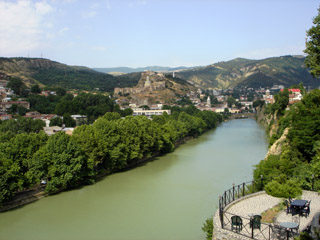
Home...
About us...
Legal status...
People...
Projects...
Search this site
...
Reviews...
Podcasts...
Publications...
Media...
Events...
Support our work...
About this site...
Privacy policy...
Contact us
You are here: Home > Publications > Russia's Challenge to NATO

Photograph: The Kura River, Tbilisi. The river runs from Turkey, through Georgia and Azerbaijan, to the Caspian Sea (William Arthurs)
Russian forces remain deep within Georgian territory, despite a ceasefire and agreement to withdraw from Georgian territory which falls within the separatist enclaves.
As the ink was drying on a ceasefire agreement, a railway bridge, near Kapsi (30 miles west of Tbilisi) that serves as the main rail connection between Tbilisi and the West of Georgia to the Black Sea ports, was destroyed by Russian forces-- though Russians deny this claim.
The Russian army continues to be spread across the western part of Georgia and are working with Abkhaz separatist fighters, seizing control of Georgian villages.
As the days pass it appears that the Russians' primary interest is in destroying as much of Georgia's infrastructure as they can, whilst appealing to the international media with talk of being honest brokers and peacekeepers. The Russians are no longer pretending that the conflict in Georgia was about its citizens in South Ossetia, and they are clearly linking the War with Georgia to other grievances they harbour in respect of security arrangements in their near-abroad.
Many analysts believe the Kremlin was spoiling for a fight to frighten off NATO from granting membership to Georgia and Ukraine, and that it was this, not concern for the citizens of South Ossetia, that explains their actions.
On Thursday 14 August, Poland decided to finalise an agreement to host part of a missile defence shield on its soil. Moscow has responded by saying it could face a nuclear strike if it allowed the US to base parts of the defence shield on its territory. And they are now speaking of arming the Baltic fleet, based in Kaliningrad, a Russian Oblast that sits between Poland and Lithuania, with nuclear warheads, and have made it plain that Poland's decision to allow the use of its territory would make it the target for a nuclear attack.
But Poland is already a member of NATO, and this can only be interpreted as a clear challenge to NATO itself.
So what is Russia's aim? To weaken and divide NATO in its present form, not simply to frighten off NATO in CIS countries in the Caucasus and central Asia.
Russia guesses that Europe's energy dependence means that, for all the tough talk, Europe will not risk a further deterioration of relations. Hence her influence will grow throughout Europe, and the war with Georgia, a small nation in the Caucasus-- an area that is anyway considered to be terminally unstable -- will be forgotten.
The trick now is to remain united as an alliance both in word and action, making it clear to all comers that the bullying of independent nations that choose their own destiny will not be tolerated. Russia can no longer hide behind the claim that she was operating as a peacekeeper in the volatile Caucasus. Russia's challenge to Poland is loud and clear, it is a challenge to all members of NATO and the EU.
Transatlantic & Caucasus Studies Institute is a working name of The Transatlantic Institute.
© The Transatlantic Institute 2004-2026. Registered charity number 1108682.